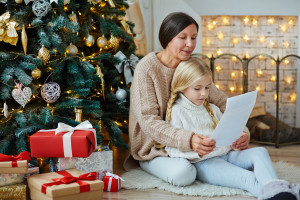 Raise your hand if your family sends out a Christmas/Holiday letter? Wow, that’s what I thought, about 10% of you. This is a bigger crisis than I thought. I’m being a little facetious, but read on and you will understand.
Raise your hand if your family sends out a Christmas/Holiday letter? Wow, that’s what I thought, about 10% of you. This is a bigger crisis than I thought. I’m being a little facetious, but read on and you will understand.
For more than 20 years, I have continued a tradition my father and mother did at Christmas – a Christmas letter. It was a time for them/us to communicate the ‘going’s on’ of our clan to those friends and family we didn’t see very often. That family tradition must have had an impression on me. That, and the 25-year Christmas diary that chronicled where we were at Christmas, who came over, who was at Christmas dinner, what we ate, presents we received. In 1978 we completed that diary. What a wonderful trip through my childhood, high school, college, and for the first five years after I left school. I delighted in the ability to read the family ‘history.’
The idea of Christmas cards is passé to most Millenials, and many Gen X’ers. “I have so many other ways to communicate, and do, why would I want to take that kind of time and expense to send out cards?” Given the ease of photo reproduction, an increasing number of people are sending photocards of either their children, pet(s), family, or all three (the over achievers have all three). A landscape of our cards reveals very few letters, or cards with notes. It is the evolution of the ritual of exchanging cards.
Some of this may be expense (almost $.50/card, just to send the card). It is more likely that the time it takes to address envelopes (unless you use labels), and even more time if you choose to write something, is a main ingredient in the reduction of how, or if, we exchange cards. In the choice of all that occurs during this time of year, people make choices of what to give up – connecting with some of your ‘people’ becomes a necessary loss. We can be relieved by having ‘one less thing to do’ during the holidays. This can be a very good thing. But, what do we lose?
My experience is that we lose some perspective of our lives, and some richness in our lives. Over time, these written histories become a treasure trove of memories, and long-forgotten information. They help us to remember not only the chronology of when something occurred, but, more importantly, the emotions of those moments – special trips, children’s activities, their growth, a special purchase, a milestone, and the loss of pets and special people. The joys and heartaches of our lives.
Keeping some written record of our lives (whether through a journal, an annual letter, the back of napkins, or through an annual letter), help us to see more clearly how choices worked out, to be thank-full for those things in our lives that helped us to become more of who we are today (we will assume you like who you are becoming). I know that the habit for me further ingrained each year, and helped to inform me of the changes in choices made that altered the individual and collective course of the family. For sure, the letters also allowed me to see God’s abundance, his love, and his grace in our history.
Evolution of habits and rituals can be a good thing. Our ‘collective’ learning allows us to make certain changes that we benefit from. Sometimes, however, we change to be more efficient, to save time. Instead, we become less effective as a human being, failing to connect as well as we could, affecting the special relationships that enrich our lives. The time we ‘saved’ might be the very time we needed to spend to experience more meaning in our lives.
Regardless of your faith tradition, this time of year is about remembering, and being thankful for what has been, and the hope for what is to come. The ‘Christmas letters’ are likely to end with Trudy and I. There is some sadness about that; along with none of the children wanting our grandfather clock.
Much of this holiday, whether Christmas, Hanukah, or Kwanzaa is about rituals and traditions. Some these you like to keep alive because they are part of the fabric of your family history; others get added along the way that also contribute to our family fabric.
As you take a moment over the next couple of weeks to ‘pause,’ maybe you can have a family conversation about what ‘traditions’ are important to your family, that add to the family ‘fabric.’
My hope for you this year is that you will discover, recover, or remember those things that add to your family.
To a better you…blessings,
